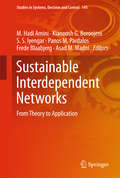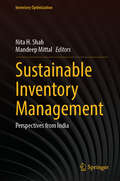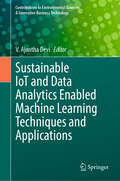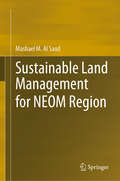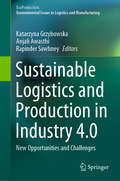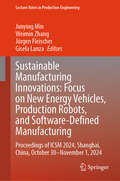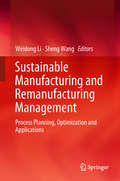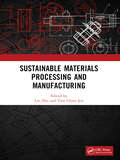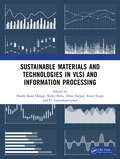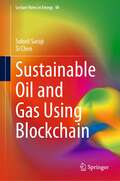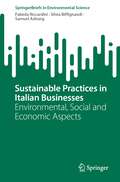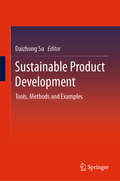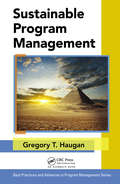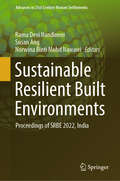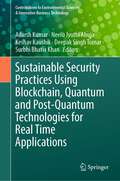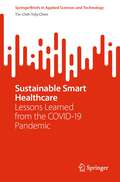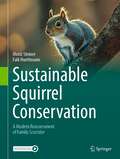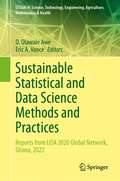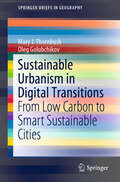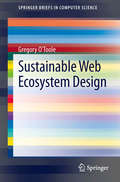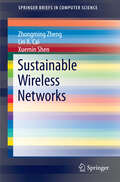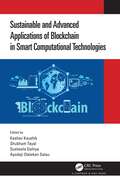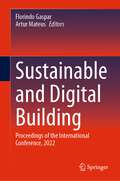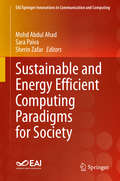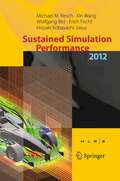- Table View
- List View
Sustainable Interdependent Networks: From Theory To Application (Studies In Systems, Decision And Control #145)
by Panos M. Pardalos Frede Blaabjerg Kianoosh G. Boroojeni M. Hadi Amini S. S. Iyengar Asad M. MadniThis book focuses on the theory and application of interdependent networks. The contributors consider the influential networks including power and energy networks, transportation networks, and social networks. The first part of the book provides the next generation sustainability framework as well as a comprehensive introduction of smart cities with special emphasis on energy, communication, data analytics and transportation. The second part offers solutions to performance and security challenges of developing interdependent networks in terms of networked control systems, scalable computation platforms, and dynamic social networks. The third part examines the role of electric vehicles in the future of sustainable interdependent networks. The fourth and last part of this volume addresses the promises of control and management techniques for the future power grids.
Sustainable Inventory Management: Perspectives from India (Inventory Optimization)
by Nita H. Shah Mandeep MittalThe book provides various research methods and ordering policies for inventory management in the sustainable environment in India. Sustainable inventory management is an area in which more studies from India are needed. In the age where global warming, environmental disasters, and increased public awareness about environmental issues encourage countries to reduce greenhouse gas (GHG) emissions, this book includes a collection of research studies that elaborate various inventory models to determine optimal ordering policy and provide helpful suggestions for reduction in carbon emission while managing inventory. The book is beneficial for practitioners, educators, and researchers in India and other countries. It is also helpful for retailers/managers to improve business functions and make more accurate and realistic decisions.
Sustainable IoT and Data Analytics Enabled Machine Learning Techniques and Applications (Contributions to Environmental Sciences & Innovative Business Technology)
by V. Ajantha DeviThis book provides a structured presentation of machine learning related to vision, speech, and natural language processing. It addresses the tools, techniques, and challenges of machine learning algorithm implementation, computation time, and the complexity of reasoning and modeling of different types of data. The book covers diverse topics such as semantic image segmentation, deep visual residual abstraction, brain–computer interfaces, natural language processing, traffic and signaling, driverless driving, and radiology. The majority of smart applications have a need for a sustainable Internet of things (IoT) and artificial intelligence. Active research trends and future directions of machine learning under big data analytics are also discussed. Machine learning is a class of artificial neural networks that have become dominant in various computer vision tasks, attracting interest across a variety of domains as they are a type of deep neural networks efficient in extracting meaningful information from visual imagery.
Sustainable Land Management for NEOM Region
by Mashael M. Al SaudThis book is the first of its type on NEOM Region, NW of Saudi Arabia. This region has been designated in 2017 to be an international economic hub. However, no studies have been done on this region which occupies several natural resources including remarkable landscape with unique ecological species, ores and water resources. The region is also vulnerable to many aspects of threatening natural hazards.Based on her expertise, namely geomorphological processes, earth sciences, space techniques and natural risk assessment, the author made an initiative to produce this book using advanced tools, specifically satellite images and geo-information system. The book introduces several thematic maps obtained for the first time for NEOM Region. Hence, it represents a scientific guide for land management and urban planning approaches. This book is a very significant document for a variety of readers and researchers including decision makers, land managers and planners, as well as geographers and geologists. In addition, the basic concepts and new approaches attract researchers and academic teams including students, universities and research centers not only in Saudi Arabia, but in different parts of the World.
Sustainable Logistics and Production in Industry 4.0: New Opportunities and Challenges (EcoProduction)
by Katarzyna Grzybowska Anjali Awasthi Rapinder SawhneyThis book proposes essential methods, models, and case studies for Sustainable Logistics and Production in Industry 4.0. In addition to identifying and discussing various challenges and future prospects, it also features numerous case studies and quantitative research from different sectors. The authors (which include academics and managers) present insightful tips on the technical, organizational and social aspects of implementing Sustainable Logistics and Production in Industry 4.0. In today’s world, changes are coming faster and more unpredictably. Production is becoming more automated, computerized and complex. In short, Industry 4.0 is creating many new opportunities, but at the same time several new challenges. This book offers a valuable resource for all academics and practitioners who want to deepen their knowledge of Sustainable Logistics and Production in Industry 4.0.
Sustainable Manufacturing Innovations: Proceedings of ICSM 2024, Shanghai, China, October 30-November 1, 2024 (Lecture Notes in Production Engineering)
by Jürgen Fleischer Gisela Lanza Weimin Zhang Junying MinThis book provides an in-depth exploration of the latest advancements in sustainable manufacturing, as presented at the International Conference on Sustainable Manufacturing. The proceedings focus on three pivotal areas: the production of new energy vehicles (NEVs), production robots, and software-defined manufacturing. The section on NEVs delves into innovations in battery technologies, lightweight materials, eco-friendly production processes, and sustainable sourcing, highlighting how these advancements reduce environmental impact and enhance efficiency. The segment on production robots examines the integration of automation and robotics to boost productivity and sustainability, emphasizing energy-efficient systems, collaborative robots (cobots), quality control, and predictive maintenance. The final part on software-defined manufacturing explores the digital transformation of manufacturing processes, discussing digital twins, the Industrial Internet of Things (IIoT), artificial intelligence, machine learning, cloud manufacturing, and cyber-physical systems. These technologies enable smarter, more adaptive, and sustainable manufacturing environments. This comprehensive collection of research and practical applications is essential for academics, industry professionals, and policymakers committed to advancing sustainable manufacturing practices.
Sustainable Manufacturing and Remanufacturing Management: Process Planning, Optimization and Applications
by Weidong Li Sheng WangThis book reports on the latest research and applications in the fields of sustainable manufacturing and remanufacturing, as well as process planning and optimization technologies. It introduces innovative algorithms, methodologies, industrial case studies and applications.It focuses on two topics: sustainable manufacturing for machining technologies and remanufacturing of waste electronic equipment, and various methods are covered for each one, including macro process planning, dynamic scheduling, selective disassembly planning and cloud-based disassembly planning. The experimental analysis provided for every method explains the benefits, as well as how they are sustainable for various real-world applications. Further, a theoretical analysis and algorithm design is presented for each, accompanied by the contributors’ relevant research, including:• step-by-step guides; • application scenarios; • relevant literature surveys; • implementation details and case studies; and • critical reviews on the relevant technologies.This book is a valuable resource for researchers in sustainable manufacturing, remanufacturing and product lifecycle management communities, as well as practicing engineers and decision-makers in industry and all those interested in sustainable product development. It is also useful reading material for postgraduates and academics wanting to conduct relevant research, and a reference resource for manufacturing engineers developing innovative tools and methodologies.
Sustainable Materials Processing and Manufacturing: Proceedings of the 3rd International Conference on Sustainable Materials Processing and Manufacturing
by Tien-Chien Jen Lin ZhuThe conference on ‘Substantial Materials Processing and Manufacturing (SMPM)’ aims to bring together scientists, researchers, and companies to attend and share their vision, ideas, recent developments as well as advanced scientific and technical knowledge in the field of materials processing and manufacturing. The conference is concerned with sustainable engineering, life cycle engineering, sustainable manufacturing systems and technologies, sustainable materials and processing, sustainable product design and development, sustainable supply chain and business models, renewable energy and sustainable development, Industry 4.0 and Internet of Things, modelling and simulation of sustainable manufacturing, intelligent agricultural equipment, etc. The conference has invited some academicians and research leaders in related fields to give the keynote report. Based on the theme of this book, eighteen outstanding and high-quality manuscripts have been selected for the publication in this book. The detailed information is presented below.
Sustainable Materials and Technologies in VLSI and Information Processing
by Avtar Singh Shilpi Birla Shashi Kant Dargar Abha Dargar D. GaneshaperumalThe International Conference on Sustainable Materials and Technologies in VLSI and Information Processing aimed to converge advancements in semiconductor technology with sustainable practices, addressing the critical need for eco-consciousness in the field of Very Large Scale Integration (VLSI) and Information Processing. The primary purpose of the conference was to explore innovative materials, manufacturing processes, and design methodologies that minimize environmental impact while optimizing performance and functionality in electronic devices. Key features of the conference included interdisciplinary discussions on sustainable materials such as biodegradable polymers, low-power semiconductor materials, and recyclable electronic components. Additionally, it focused on emerging technologies like quantum computing, neuromorphic computing, and photonic integrated circuits, exploring their potential contributions to sustainability in VLSI and information processing. The intended audience comprised of researchers, scientists, engineers, and industry professionals from academia, government, and private sectors involved in semiconductor technology, materials science, environmental sustainability, and information processing.What set this conference apart was its unique emphasis on sustainability within the realm of VLSI and information processing. While there are conferences focusing on either semiconductor technology or sustainability separately, this conference bridged the gap between the two, fostering discussions and collaborations that pave the way for greener and more efficient electronic devices and systems.
Sustainable Oil and Gas Using Blockchain (Lecture Notes in Energy #98)
by Si Chen Soheil SarajiThis monograph explores the potential of blockchain technology to facilitate the transition in the oil and gas (O&G) industry.As the world shifts towards a sustainable energy future, the oil and gas industry faces significant challenges and opportunities. Focusing on the development of a sustainable O&G industry, the book delves into the role of climate and financial markets in the energy sector, applications of blockchain in sustainable energy development, and the challenges of legal and regulatory issues in applying blockchain technology. It provides insight into how the energy industry is already working on reducing carbon emissions and paving the way to a sustainable future with detailed examples of reducing methane emissions, carbon credit markets, sustainable aviation fuels, and plastics. The book also examines how O&G companies could further their sustainability initiatives using blockchain technology for emission data monitoring, carbon capture, utilization, storage, and supply-chain management to develop clean products.
Sustainable Practices in Italian Businesses: Environmental, Social and Economic Aspects (SpringerBriefs in Environmental Science)
by Silvia Biffignandi Fabiola Riccardini Samuel AshongThis SpringerBrief describes the development and use of a synthetic indicator to assess different degrees of sustainability adoption by economic sector and businesses size. To make this analysis a theoretical framework which involves variables common to alternative frameworks (specifically ESG, GRI and Istat) is proposed. The empirical analysis focuses on the environmental, social and economic variables of the Italian businesses. In this analysis, all three pillars of sustainability – economic, environmental, and social – are considered. The work begins with a review of business sustainability literature and a look into institutional frameworks for the development and measurement of the phenomena. Connections between businesses and the SDGs are examined and comparison of the classifications of sustainable activities defined by GRI and ESG international standards is used to define a framework to be adopted to analyse ISTAT Business Census. Selected indicator variables are aggregated with a synthetic indicator and the results are presented (this is a new proposal of a synthetic indicator useful for the type of data used and published by ISTAT – Italian National Statistical Institute), discussing pros and cons of using it. This study provides two important innovative contributions. The first one is about how to approach the theoretical framework of businesses sustainability at firms aggregated level. The basic idea to work on a set of variables common to different approaches is interesting from the interpretative point of view. The second one, is about the specific empirical analysis, i.e. the Italian businesses sustainability situation. The investigation based on this new theoretical classification/framework and the new proposed indicator provides some interesting substantive results.
Sustainable Product Development: Tools, Methods and Examples
by Daizhong SuThis book offers a comprehensive review of sustainability and product design, providing useful information on the relevant regulations and standards for industries to meet increasing market demands for eco-products, while reducing their impact on the environment. The examples and methods presented allow readers to gain insights into sustainable products. The authors also explain how to develop products with sustainability features by applying tools and methods for sustainable design and manufacture. These tools/methods include• Regulations/directives related to sustainable product development• Popular lifecycle analysis software packages• Environmental and social lifecycle impact assessment methods• Lifecycle inventory databases• Eco-point and eco-accounting infrastructure• ICT and traceability technologies for sustainable product development• Sustainable design and manufacture• Integrated approach for sustainable product developmentA description of each sustainability tool is accompanied by easy-to-understand guidelines as well as sustainable product development methods. Five different case studies are also presented to illustrate how to apply the tools and methods into the development of real sustainable products.In view of the increasing pressure on industries to meet the, sometimes conflicting, demands of the market and environment, this book is a valuable resource for engineers and managers in manufacturing companies wishing to update their knowledge of sustainable product development. It is also suitable for researchers and consultants who are involved or interested in sustainable product development, as well as for students studying sustainable development, production, and engineering management.
Sustainable Program Management (Best Practices in Portfolio, Program, and Project Management)
by Gregory T HauganThe world is undergoing major transitions due to changes in three driving forces-population, climate, and energy resources-making it essential for us to achieve sustainability in the implementation of projects and programs as well as our everyday life. This book provides essential information on the three major driving forces of the coming decades and presents options to assist us in moving toward a sustainable future. It uses a format that makes it easy to understand and apply to medium and long-range planning.
Sustainable Resilient Built Environments: Proceedings of SRBE 2022, India (Advances in 21st Century Human Settlements)
by Susan Ang Rama Devi Nandineni Norwina Binti Mohd NawawiThe proceedings of Sustainable Resilient Built Environments are based on the SRBE 2022 conference held in December 2022. It focuses on the advances under the overarching theme of ‘Sustainability’. The concept of ‘Sustainability’ has been conventionally defined as meeting the needs of the present without compromising the ability of future generations to meet their own needs. In scientific literature, sustainable development has been analysed using different qualitative approaches, such as economic, social, ecological, cultural, institutional, ethical, and political. In this edited volume, the concepts of both ‘sustainability’, and ‘resilience’ are considered to open up useful pathways towards achieving sustainable buildings and infrastructure. Though the concepts of sustainability and resilience are considered to help improve the built environment, the interrelations and interdependence between these two concepts are not clearly evident. This has led to the questions such as: Is thesustainable built environment always resilient? Is the resilient built environment always sustainable? What more is needed for sustainability? In exploring these pertinent questions, the proposed edited volume is expected to unveil and disseminate new insights on the themes related to sustainable and resilient built environment.The themes of the proceedings lay a platform for researchers and professionals to integrate the aspects including smart, innovation, technologies, green, energy efficiency, carbon reduction, sustainability and resilience with regard to buildings and other built infrastructure. Specific objectives included as per the five themes are as follows:Environment Design and SustainabilitySustainable & Smart BuildingsCommunity Resilience & Social SustainabilityHeritage and SustainabilityPandemic issues and sustainable development
Sustainable Security Practices Using Blockchain, Quantum and Post-Quantum Technologies for Real Time Applications (Contributions to Environmental Sciences & Innovative Business Technology)
by Adarsh Kumar Keshav Kaushik Deepak Singh Tomar Neelu Jyothi Ahuja Surbhi Bhatia KhanThis book focuses on the sustainable security practices in the domain of blockchain, quantum, and post-quantum technologies dealing with the real-time applications. The topics discussed in this book include banking applications, protection of digital assets in healthcare, military defense applications, supply chain management, secure messaging, and keyless secure infrastructures.Blockchains and quantum technologies are the emerging technological developments both in academic and industrial domains. The problems related to quantum threat and execution of post-quantum signatures in a blockchain platform have become hot topics in today's scientific community because they have remarkably progressed in recent years and have found a variety of applications.This book is a valuable resource for academicians, researchers, students, and technicians in the field of blockchain and quantum computing.
Sustainable Smart Healthcare: Lessons Learned from the COVID-19 Pandemic (SpringerBriefs in Applied Sciences and Technology)
by Tin-Chih Toly ChenThis book shows how smart technology applications to mobile healthcare will be different in the post-pandemic era. Prior to the Covid-19 pandemic, smart technologies had been widely applied to mobile health care. It will be the same in the post pandemic. However, the widely used smart technologies before and after the Covid-19 pandemic may be different. First, users’ motivations for applying smart technologies have changed. In addition, some innovative ways of applying smart technologies within the Covid-19 pandemic have emerged. Further, users’ acceptance of smart technology applications has increased. Furthermore, new smart technologies are still being proposed. This book discusses these topics.
Sustainable Squirrel Conservation: A Modern Reassessment of Family Sciuridae
by Falk Huettmann Moriz SteinerThis book attempts to move the family of squirrels (Sciuridae) out of the shadow of large charismatic mammals and to highlight management failures with the goal of moving towards an improved conservation approach. Particular attention is paid to the influence of taxonomic science on squirrel conservation. In addition, the authors show how human-driven climate change, global change and modern politics are shaping global squirrel populations as well as their surrounding environments and ecosystems.Squirrels are widespread around the globe, naturally occurring on every continent except Antarctica and Oceania, and they are certainly among the animals most commonly encountered in everyday life. Despite this, the authors of this volume identify worrying gaps in squirrel conservation. Squirrels are often hunted, trapped, poached, and stressed, and management strategies and legislation are often devised in the absence of proper knowledge of issues such as population sizes, taxonomies, and trends. Together, this can result in severe population declines and even species extinction. By assessing their taxonomic situation, ecology, the evolution and divergence of Sciuridae around the globe, and squirrels’ well-being across habitats, the authors set a baseline from which to launch future investigations into the conservation of squirrels and other species. Additionally, the authors highlight the influences of climate change, unsustainable growth, and various man-made threats to the future of this family.
Sustainable Statistical and Data Science Methods and Practices: Reports from LISA 2020 Global Network, Ghana, 2022 (STEAM-H: Science, Technology, Engineering, Agriculture, Mathematics & Health)
by O. Olawale Awe Eric A. VanceThis volume gathers papers presented at the LISA 2020 Sustainability Symposium in Kumasi, Ghana, May 2–6, 2022. They focus on sustainable methods and practices of using statistics and data science to address real-world problems. From utilizing social media for statistical collaboration to predicting obesity among rural women, and from analyzing inflation in Nigeria using machine learning to teaching data science in Africa, this book explores the intersection of data, statistics, and sustainability. With practical applications, code snippets, and case studies, this book offers valuable insights for researchers, policymakers, and data enthusiasts alike.The LISA 2020 Global Network aims to enhance statistical and data science capability in developing countries through the creation of a network of collaboration laboratories (also known as “stat labs”). These stat labs are intended to serve as engines for development by training the next generation of collaborative statisticians and data scientists, providing research infrastructure for researchers, data producers, and decision-makers, and enabling evidence-based decision-making that has a positive impact on society. The research conducted at LISA 2020 focuses on practical methods and applications for sustainable growth of statistical capacity in developing nations.
Sustainable Urbanism in Digital Transitions: From Low Carbon to Smart Sustainable Cities (SpringerBriefs in Geography)
by Mary J. Thornbush Oleg GolubchikovThis book examines how contemporary urbanism is influenced by digital and low carbon transitions. From its infancy at the scale of individual buildings, a focus on ‘green’ agenda, energy, and resource efficiency has fostered research and policies for low carbon cities, eco-cities, and increasingly intelligent and smarter urban systems. Cities around the world are getting ‘smarter’ as more advanced technology is integrated into urban planning and design. People are relying more on digital and information and communication technology (ICT) in their daily lives, while cities are adopting more digital technology to monitor and gather information about people and their environment. This leads to Big Data collection, which is used to inform governance and improve urban performance. These transformations, however, raise critical questions, including whether emerging smart sustainable cities are too technocratic, but also with regard to citizen involvement. This brief addresses these important contemporary concerns through a review of literature and existing urban strategies. It should be of interest to everyone involved in advancing sustainable cities and smart cities. It should also be a relevant read for students and researchers in this area.
Sustainable Web Ecosystem Design
by Gregory O'TooleThis book is about the process of creating web-based systems (i.e., websites, content, etc.) that consider each of the parts, the modules, the organisms - binary or otherwise - that make up a balanced, sustainable web ecosystem. In the current media-rich environment, a website is more than a collection of relative html documents of text and images on a static desktop computer monitor. There is now an unlimited combination of screens, devices, platforms, browsers, locations, versions, users, and exabytes of data with which to interact. Written in a highly approachable, practical style, this book is useful for stakeholders, system administrators, developers, designers, content managers, and the anonymous web user in industry, as well as faculty, staff, and students of all levels involved in teaching and learning in information technology.
Sustainable Wireless Networks
by Zhongming Zheng Lin X. Cai Xuemin ShenThis brief focuses on network planning and resource allocation by jointly considering cost and energy sustainability in wireless networks with sustainable energy. The characteristics of green energy and investigating existing energy-efficient green approaches for wireless networks with sustainable energy is covered in the first part of this brief. The book then addresses the random availability and capacity of the energy supply. The authors explore how to maximize the energy sustainability of the network and minimize the failure probability that the mesh access points (APs) could deplete their energy and put the network out of service due to the unreliable energy supply. This brief also studies network resource management issues in green wireless networks to minimize cost. It jointly considers the relay node (RN) placement and sub-carrier allocation (RNP-SA) issues in wireless networks with sustainable energy, and then formulates the problem into a mixed integer non-linear programming problem. Concise and informative, this brief is a useful resource for professionals or researchers studying wireless networks, communication networks, and energy efficiency. Advanced-level students interested in energy technology or communications engineering will also find the material valuable.
Sustainable and Advanced Applications of Blockchain in Smart Computational Technologies
by Shubham Tayal Ayodeji Olalekan Salau Keshav Kaushik Susheela DahiyaThis book concentrates on the sustainable applications of the Blockchain Technology across multiple latest computational knowledge domains. It covers the feasible and practical collaboration of Blockchain Technology with latest Sustainable Smart Computing Technologies. It will target the vast applications of Blockchain in the field of Internet of Things, Artificial Intelligence, and Cybersecurity. The book effectively provides satisfactory information about the essentials of Blockchain and IoT to a typical pursuer alongside encouraging an examination researcher to distinguish some modern issue regions that rise up out of the intermingling of the two advancements. Besides, the creators talk about pertinent application zones, for example, smart city, e-social insurance, and so forth along the course of the book. • Covers the recent advancements in Blockchain technology • Discusses the applications of Blockchain technology for real life problems • Address the challenges related to implementation of Blockchain technology • Includes case studies • Includes the latest trends and area of research in Blockchain Technology This book is primarily aimed at graduates, researchers and professions working in the field of blockchain technology.
Sustainable and Digital Building: Proceedings of the International Conference, 2022
by Florindo Gaspar Artur MateusThis book presents the Proceedings of the International Conference on Sustainable and Digital Building, at Marinha Grande, Portugal held in October 2022. The Conference created a forum for discussion of a range topics on this broad area, including building materials, building processes, digital technologies, and building sustainability. A major focus of the collection is green building throughout a structure’s life-cycle—from planning to design, construction, operation, maintenance, renovation, and demolition. In addition, the Conference examined industry making the transition to digital transformation of buildings, a key benchmark to realizing European climate goals and achieving net-zero carbon buildings by 2050.
Sustainable and Energy Efficient Computing Paradigms for Society (EAI/Springer Innovations in Communication and Computing)
by Sara Paiva Mohd Abdul Ahad Sherin ZafarThis book provides insights into recent trends and innovation of technologies aiming to provide sustainable and energy efficient computing. The authors discuss approaches to provide solutions to real life societal issues and problems using sustainable and energy efficient computing approaches. The book gathers research and state of the art reviews on solutions for societal benefits by using sustainable approaches of computing. The book also intends to provide use-cases for certain real life societal problems. The book can be used by researchers of similar areas, technologists, environmentalists, educationists, research scholars and UG/PG Students as well.
Sustained Simulation Performance 2012
by Xin Wang Michael M. Resch Wolfgang Bez Erich Focht Hiroaki KobayashiThe book presents the state of the art in high performance computing and simulation on modern supercomputer architectures. It covers trends in hardware and software development in general and specifically the future of high performance systems and heterogeneous architectures. The application contributions cover computational fluid dynamics, material science, medical applications and climate research. Innovative fields like coupled multi-physics or multi-scale simulations are presented. All papers were chosen from presentations given at the 14th Teraflop Workshop held in December 2011 at HLRS, University of Stuttgart, Germany and the Workshop on Sustained Simulation Performance at Tohoku University in March 2012.
